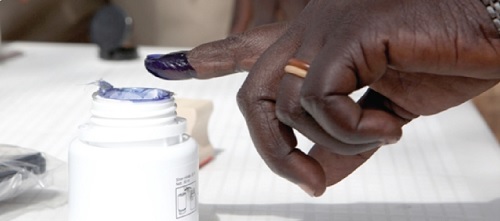
Pros, cons of indelible ink discontinuance
Ghana’s Electoral Commission has proposed to discontinue the use of indelible ink for the 2024 general election.
Advertisement
This is because the biometric identification system it uses is designed to automatically identify and flag any instances of multiple registration and voting, thus preventing double voting.
It is worth noting that the EC's proposal is not unique to Ghana.
Post-conflict Bosnia and Herzegovina introduced indelible ink in the first post-conflict parliamentary and presidential elections in 1996 due to deficiencies in the voter register.
However, in the following years, when a credible new voter register was created its EC discontinued using indelible ink.
Similarly, in Cambodia's 2018 general elections indelible ink usage was considered unnecessary as voters were already authenticated through biometric verification.
Its use was seen as undermining confidence in technologies already employed.
Given the examples mentioned above, it is reasonable for the EC to discontinue the use of indelible ink in the administration of the elections given that there are no deficiencies in the voter register that could seriously undermine the integrity of the vote.
Moreover, the biometric authentication system can prevent abuse of the system.
The proposal to discontinue the use of indelible ink in Ghana's elections has been a topic of discussion in recent times.
While some argue that it adds a layer of integrity to the electoral process, others believe that it causes more harm than good.
In this regard, it is important to briefly examine the advantages and disadvantages of using indelible ink before arriving at a decision.
Advantages
First, it is worth noting that its use adds a layer of integrity to the electoral process.
For instance, in Myanmar's 2015 elections, indelible ink was used to mitigate the risk of multiple voting and impersonation, contributing significantly to reinforcing the electoral process's credibility and increasing voter confidence in it.
Second, the use of indelible ink builds trust, particularly in regions such as ours where suspicion and mistrust in individuals and state institutions are common.
Third, it encourages active citizen participation, especially among first-time voters.
In India and Myanmar, first-time voters were excited to share pictures of their inked fingers on social media to demonstrate their active public participation.
Fourth, humans are loss-averse, meaning people are likely to resist any action that may result in a perceived loss of something they already possess rather than a failed promise.
Therefore, if the EC were to guarantee an additional layer of integrity but failed to deliver, people's reaction and anger would be comparatively less severe compared to removing an existing layer of integrity.
Disadvantages
First, the ink can stain the ballot paper if applied to the finger before receiving the ballot paper.
Advertisement
This can increase the rate of rejected ballots.
To mitigate this, voters are sometimes given tissues to wipe excess ink from their fingers.
Applying ink after the voter has cast the vote will reduce the level of rejected ballots.
However, the voter may refuse to have their finger inked after voting, but this can be easily resolved.
Second, its usage can increase the time it takes for voters to cast their votes.
Advertisement
Voters' fingers must be inked, and they must wait for it to dry before being given the ballot.
However, given that Ghana has used this method for the past thirty years, it should not be a significant problem.
Third, it is argued that the use of indelible ink increases the cost of elections.
However, the question is what is the cost of the ink?
Advertisement
Is it not less than the cost that its discontinuation will cause in terms of credibility, possible violence and electoral disputes by losing candidates?
It is worth noting that the EC's proposal to discontinue the use of indelible ink has been criticised by many ordinary Ghanaians and prominent members of the governing New Patriotic Party (NPP) and the opposition National Democratic Congress (NDC).
They include a former Speaker of Parliament, Prof. Mike Oquaye; the Majority Leader, Osei Kyei-Mensah-Bonsu, and Nana Akomea from the NPP.
From the NDC are Former President John Dramani Mahama, Minority Leader, Dr Cassiel Ato Forson, and the National Chairman of the NDC, Johnson Asiedu Nketiah.
Suggestions
Considering the aforementioned factors, it is suggested that the EC should consider public opinion and withdraw its decision to discontinue the use of indelible ink in the upcoming elections.
Given that ordinary Ghanaians and prominent members of both the NPP and NDC are against it, it is clear that society is not in favour of discontinuing its use at this time.
As indicated above, the use of indelible ink can help add a layer of integrity to the electoral process, build public confidence, and reduce mistrust and suspicion in EC's work.
Furthermore, the EC can explore ways of using the ink to increase voter turnout in the upcoming elections.
Suriname successfully implemented this technique in 2005 by using ink that was close to their national colours, and voters proudly displayed their inked fingers.
In conclusion, while the use of indelible ink may have some disadvantages, its advantages outweigh them.
Thus, the EC should continue to use indelible ink in Ghana's elections as it helps to maintain the credibility and integrity of the electoral process in order not to give anybody a reason to contest the results of the elections.
The writer is a Political Scientist




